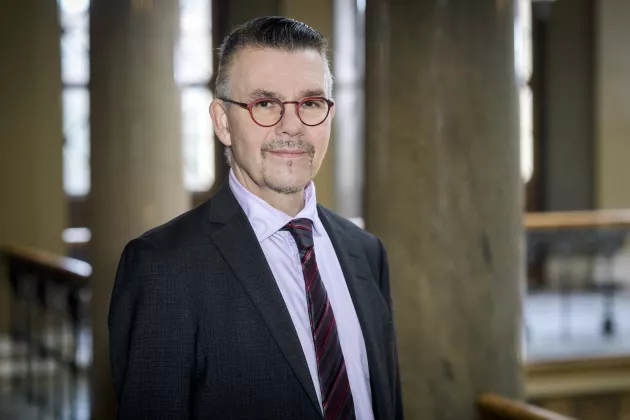With five guiding principles – Quality, Creativity, Integrity, Communication, Character – and Campus Development, we set a course at the start of the year for the direction that we want to move in together at Lund University.
The campus was more or less deserted for the first six months of the year, as students and staff had to work remotely. The fact that teaching and research could continue under these extraordinary conditions is testimony to the impressive efforts of all the teaching staff, researchers, administrators and students.
From the lessons that the organisation has drawn so far from remote work and teaching, I am assured that digital teaching and meetings are a good complement to face-to-face meetings and on-campus teaching. Digitalisation has only just begun and the University is developing digital formats for teaching, assessment and public defences of doctoral theses. Digital learning environments are a part of campus development that we will see more of in the future. We have also seen that it is possible to develop more flexible forms of working for all those who can, and wish to, work remotely part of the time.
Having said that, we have also made an important clarification during the year: Lund University is primarily a campus university. Young students’ wellbeing, personal development and opportunities to create social and professional networks during their years of study are all keys to a satisfactory university education. To fulfil this, there is a need for young students to meet their fellow students on and outside campus. The same applies for staff who need collegial face-to-face interactions, when an unexpected conversation can arise and ideas are snapped up in corridors and lunch rooms.
During the pandemic, we have seen an increase in cases where students are reported for cheating and several of these cases concern digital assessment. To prevent cheating and ignorance relating to digital examinations, the University launched a portal at the start of the year, education.lu.se, to provide support for both students and teaching staff.
The management is working to develop education in several ways. This includes major work that started in the autumn on a vision regarding lifelong learning. New projects based on such a vision are expected to start in 2022. Sustainability, interdisciplinarity, Artificial Intelligence and digitalisation are examples of the course development ingredients within lifelong learning.
Renewal of research has been a theme throughout the year. The internal, overall research evaluation RQ20, which was presented in the spring, formed the basis for this renewal work. The Swedish Research Council’s Research Barometer has also been an important element. The former shows, among other things, that research at LU is very strong but the University should be better at utilising the disciplinary breadth and the research infrastructures that are available. The latter shows that the University’s publications have increased but that citations have decreased. Several initiatives have started to provide greater scope for creating complete and innovative knowledge environments involving research, external engagement and education. These environments are to be able to compete for both EU grants and national funding, for example in the coming investment in profile areas that the government announced in latest research policy Bill. The work on identifying profile areas began in the autumn and will continue in 2022.
In the same spirit – to work for disciplinary breadth and conduct internationally competitive research – an excellence programme in research was created during the year, focusing on Agenda 2030 and sustainable development. In March, the University decided to allocate SEK 100 million of university-wide funds to the programme in two parts: one involving postdoc positions in interdisciplinary projects and another involving new doctoral studentships in the Agenda 2030 graduate school.
The EU is one of the University’s largest sources of funding in research and the new framework programme Horizon Europe started in 2021. The University is working purposefully to further strengthen and broaden participation in this framework programme. The University also intends to extend and increase its involvement in EUGLOH, a part of the EU’s partnership programme European Universities, which works for mobility and exchanges for students and staff at European higher education institutions.
Those in Lund will see that Sölvegatan, which is a part of the Knowledge Highway, is in the process of getting a new addition. The new towering glass facade taking shape will house Forum Medicum where medical, health and nursing programmes will be brought together in close proximity to the Biomedical Centre, BMC, and the Skåne University Hospital in Lund. The move-in will be in 2023. There are also plans for a Social Sciences Centre along the Knowledge Highway in the Paradis quarter. The Faculty of Fine and Performing Arts is also planning for its new, cohesive premises in Malmö with the move-in planned for 2025. In the longer term, Lund University is planning for Science Village – the area between the two research facilities MAX IV and ESS. There is considerable potential here to form an international research, innovation and education centre.
During the year, we have also worked to further develop Lund University as a workplace. This applies to everything from attracting and recruiting national and international expertise to retaining those people who come here to conduct research. Here too, RQ20 forms a basis for the University’s development, as does the EU’s certification HR Excellence in Research.
Now, with only a few shivering days remaining of 2021, it is time for me to say: ring out the old year and ring in 2022!
Take care of yourselves during the holidays!
/Erik Renström, Vice-Chancellor


